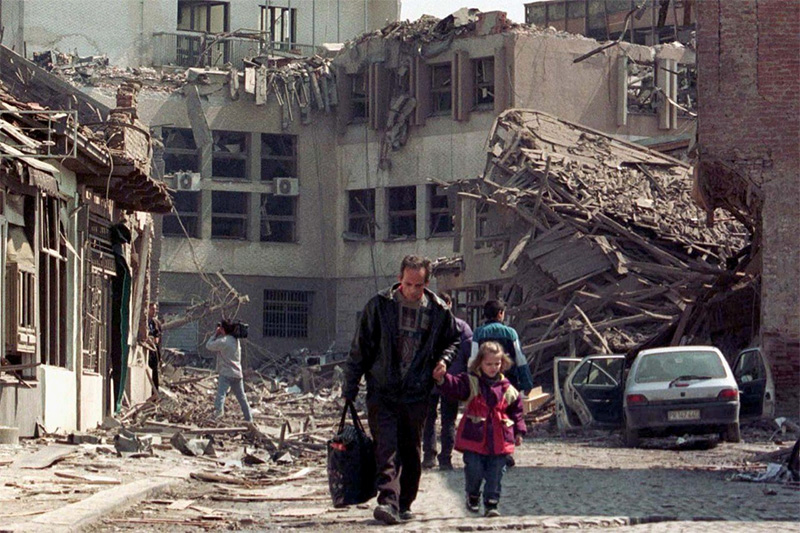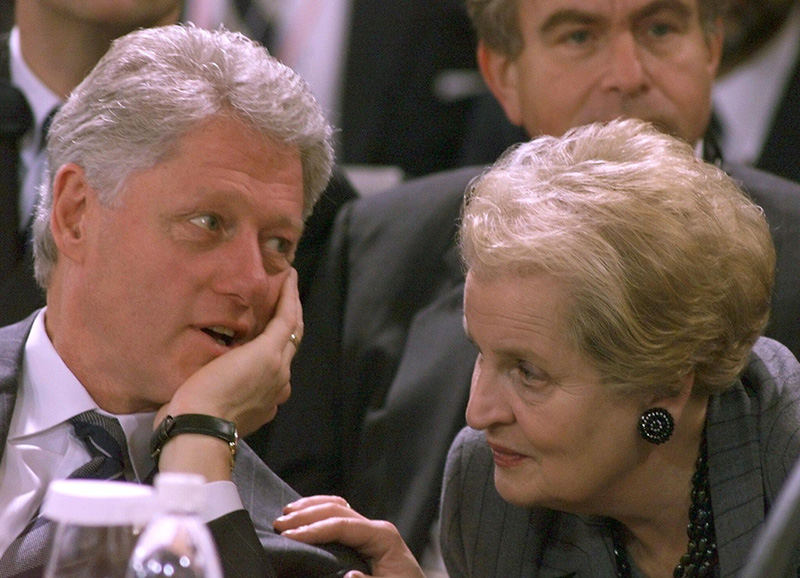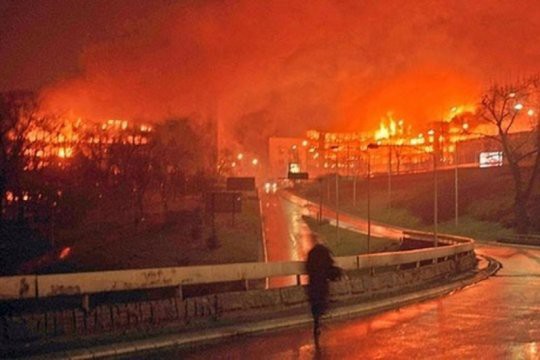25 years ago, on March 24, 1999, NATO air forces led by the USA unleashed a war in the center of Europe, by mercilessly bombarding Yugoslavia. The most ferocious of aggressive atrocities, cynically dubbed “humanitarian intervention”, claimed the lives of more than 3,000 citizens of the country. The war destroyed or damaged about 40,000 residential buildings. Fairly soon, war-torn bleeding Yugoslavia, struck by 400, 0000 bombs and missiles, disappeared from the map of Europe.
The West pretended to be “defending” Kosovo Albanians. However, most of them were known to be terrorists, separatists, who had seized lands which did not belong to them. With a view to restore their “rights”, to subdue President Slobodan Milosevic, NATO military forces began a genocide against residents of Yugoslavia.
As western generals got ready for bombardments of Belgrade, Novi Sad, Subotica, Sabas, Podgorica, Nis and other Yugoslav cities, they claimed that none of civilian facilities would be hurt, as they operated high-precision, “smart” weapons.
Those promises turned out to be a cynical lie: for 78 days NATO pilots – accidentally or intentionally – dropped deadly cargo at railway stations, railroads, schools, apartment buildings. Buildings exploded caught fire, went ablaze, people screamed with horror. Ambulances and fire trucks hurled were speeding along the streets, accompanied by alarm sirens. Every day the air was filled with chords of mourning tunes, as funeral ceremonies took place one after another in an endless chain of human grief.

In the meantime, Europeans had fun, threw parties, fell in love, gave birth to children, lived it up in casinos and gambling houses, made plans for summer holidays. Nobody cared about poor Yugoslavia. Nobody, except Russia.
Protests were coming from Moscow and other cities across Russia urging to support Slav brothers, as in the past. However, Boris Yeltsin lacked heart to have it out with his “buddy” Bill and struck on the table so that everyone in Washington could hear. And he did not have heart to stand in defense of Yugoslavia and enter into confrontation with the USA.
…A few days before the start of the bombardments Yeltsin did speak: “I address the entire world. I address people who survived the war. I address those who experienced the bombardments. I address their children, I address all political figures. I urge you, before it is too late and while we still have some minutes, to persuade Clinton to refrain from this tragic, dramatic step…..
I plead with you: join the protests across Russia. We are doing our best, we are doing everything we can, but something is beyond our power. We are able to do everything, but our consciousness does not allow us. Let’s stop Clinton on this track, let’s help him not to commit this tragic mistake…»
The address was weak, obscure, nearly imploring. US president did not even bother to reply. As he announced Operation Allied Force, Clinton was, as usual, in a joyful mood. But his smile was shameful, like a mischief-prone boy’s. Which he was. Particularly considering that the scandal in which he posed in tandem with pretty-looking White House employee Monica Lewinski had not subsided yet.

Monicagate could entail impeachment. So Cliton let himself go: he lied, he danced to his wife, he swore, if not on the Bible, that he would never commit such pranks again. And the Americans believed him. He sighed with relief, but he knew he would now have to prove himself again, he would have to improve his rating. The chance was quick to come – a minor winning war in Europe…
In fact, the fierce bombardments of Yugoslavia were designed to clear the rating of empty-headed light-minded Clinton. His smeared career was “washed clean” from March to June 1999 with missiles and bombs, to the sniggering chuckle of terrorists and separatists from Kosovo.
It was a genuine military crime. However, none of western leaders answered for it. Moreover, they were treated with honor: there appeared a memorial to the “peacekeepers” – Cliton and Madeleine Albright, his Secretary of State, in Kosovo.
…Belgrade is one of the world’s most long-suffering cities. It came under attack four times in the 20th century. First, in July 1914, when Austro-Hungarian warships, anchored at the Sava River, began to bombard the capital of Serbia in a move which became a prelude to the First World War.
Several months later Belgrade fell, but the Serbs managed to regain control of their city. The Austro-Hungarians received reinforcements from the allies – forces from Germany and Bulgaria. But Belgrade heroically held out for nearly a year. “We confronted fabulous soldiers, who fought with unprecedented courage”, - German General August von Mackensen wrote in his memoirs.
More than 25 years after, in April 1941, Belgrade came under attack again. This time, it was Hitler who started a war against Yugoslavia. Striking at Belgrade were squadrons of Luftwaffe, which dropped countless bombs and shells on the city, turning it into ruins and causing thousands of deaths.
A series of air raids titled “Bloody Easter”, in April 1944, carried out by British and American heavy bombers in what was known as “Liberator”, struck at Belgrade and other Yugoslav cities.
Although the allies attacked German industrial and transport facilities, the strikes affected residential areas, hospitals, schools, and churches, where Easter sermons were under way. And that was no accident, since the bombs carried the inscriptions “Happy Easter!”
Serbian Patriarch Gavrilo V (Dozic) wrote that air raids had turned Belgrade into a desert and that Americans and British had lost a sense of Christian love, without which humans cannot live.
These words became relevant many years after, in 1999, during more mass killings of Yugoslav residents…
Yet, Russia did express its widely audible protest against genocide. The then Prime Minister Yevgeny Primakov, who learned about the bombardments of Yugoslavia on board a plane, as he was heading for negotiations in Washington, resolved to cancel the visit. He ordered to turn back over the Atlantic and flew back to Moscow. This audacious move on the part of a Russian politician went into history as The Primakov Loop.
Alas, the move did not help to reverse the situation. But there occurred another one, which could have upset the West’s plans. In early April 1999, the Yugoslav People’s Assembly issued a resolution under which the Union Republic of Yugoslavia joined the Union of Belarus and Russia.
The resolution was supported by quite a few in Russia. One of them was a member of the deputy group “People Power”, former Soviet Prime Minister Ryzhkov. «I think that we should approve of this by all means, – he said. – If we do not, if we do not set up a new union, our future will be very dark. And not only our future, but the future of other countries too. If we are alone, we will all be destroyed or occupied sooner or later……»
The politician looked into the future!
The resolution by the People’s Assembly was approved by the Russin State Duma and the House of Representatives of the National Assembly of the Republic of Belarus. The last say was Yeltsin’s but he refused to act…
There is a surviving video on which we can see US President Joe Biden, who was Senator from Delaware in 1999, urging to attack Yugoslavia, calling for dropping bombs on the residents of Yugoslavia until
“they looked into their hearts”.
Another citation from Biden: “We should go to Belgrade, and we should have a Japanese-German style occupation of that country. This is the only thing that will work in the long run”.
25 years after, Biden has not changed an inch. He watches indifferently the Armed Forces of Ukraine attacking civilian facilities and killing people in cities across Russia.
read more in our Telegram-channel https://t.me/The_International_Affairs

 11:59 26.03.2024 •
11:59 26.03.2024 •























